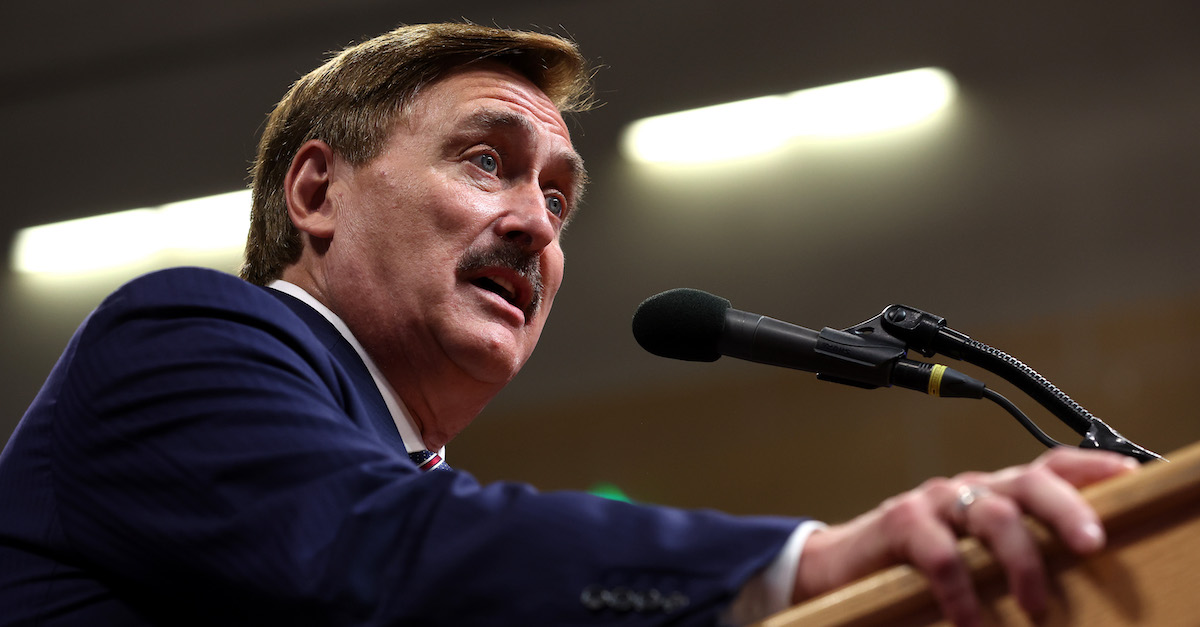
Mike Lindell gives a thumbs up as he passes by a rally for supporters of former President Donald Trump, Tuesday, April 4, 2023, in West Palm Beach, Fla. (AP Photo/Wilfredo Lee).
A federal appellate court on Wednesday gave erstwhile bedding titan and stalwart election denialist Mike Lindell a significant victory by voiding a $5 million award previously won by a software engineer.
In 2021, the outspoken supporter of President Donald Trump“s 2020 election claims issued the “Prove Mike Wrong” challenge at a South Dakota symposium — showcasing data purportedly proving the People’s Republic of China had interfered with the 2020 U.S. election.
Engineer Robert Zeidman — a Trump supporter himself — rose to the challenge offered by the onetime QVC star. Despite some doubt about his own abilities, Zeidman appeared to win the contest.
While Lindell rejected Zeidman’s apparent victory every step of the way, the engineer was vindicated by independent bodies. His apparent victory was affirmed by both an arbitration panel and a federal district court in the North Star State.
Now, the U.S. Court of Appeals for the Eighth Circuit has ruled that Lindell Management LLC does not have to pay the $5 million after all.
Love true crime? Sign up for our newsletter, The Law&Crime Docket, to get the latest real-life crime stories delivered right to your inbox.
The seeds of Lindell’s long-coming victory are obvious in the February 2024 opinion by U.S. District Judge John R. Tunheim.
Even then, the judge cautioned that had he been asked to interpret the contract terms initially, he might very well have reached a different conclusion, but he offered a substantial degree of latitude to the arbitration panel.
“The panel’s conclusion that the contract referred to data specifically from the election process considered the fact that anything even remotely connected to the election, as Lindell LLC proposed, could include newspaper articles and broadcast news which would effectively negate the purpose of having a challenge to begin with,” the district court opinion reads. “The Court finds this step in the interpretation to logically honor and harmonize the contract.”
This harmonization proved fatal to Zeidman’s claim.
Both the district court and the appellate court agree that the arbitration panel used additional language outside the terms of the challenge rules themselves to interpret the contract.
That language comes from the advertisements for the challenge.
When issuing the challenge, Lindell said his team of experts would provide “cyber data and packet captures from the 2020 November election” and said the upshot of the challenge was to “find proof that this cyber data is not valid data from the November Election.”
But the challenge rules were much less specific.
The challenge rules signed by Zeidman categorized the contest in the following way: “participants will participate in a challenge to prove that the data Lindell provides, and represents reflects information from the November 2020 election, unequivocally does NOT reflect information related to the November 2020 election.”
For the arbitration panel, the official rules seemed to be far too expansive. The district court called the rules “poorly written.” The arbitrators and Tunheim reasoned there was nothing to challenge unless they also looked to the advertisements to narrow down the contest to a dispute over election packet capture data, also referred to as “PCAP data” in the rulings.
Here’s how the arbitrators summed up their decision: “Zeidman proved that each file did not include packet capture data and thus was not related to the November 2020 election, so he had satisfied the Challenge rules, and was entitled to the $5 million reward.”
Again, Tunheim was skeptical. He said he “finds it to be quite a leap that the only possible data that could constitute ‘election data’ would be packet capture data.”
That skepticism proved prescient.
“The court inferred that the panel used extrinsic evidence to reach this interpretation of unambiguous contract language, contrary to Minnesota contract law,” the appellate court noted.
In other words, using the advertisement’s verbiage to limit the scope of the challenge rules is not in line with how contracts are to be interpreted in Minnesota.
“The parties agreed that the Rules are unambiguous, and Minnesota law provides that, in interpreting unambiguous contracts, the intent of the parties must be determined from the language of the contract alone without resort to extrinsic evidence,” the appeals court went on. “We agree.”

MyPillow CEO Mike Lindell speaks during a “Save America” rally at Alaska Airlines Center on July 9, 2022, in Anchorage, Alaska (Photo by Justin Sullivan/Getty Images).
Here, the major problem for the arbitration panel was how they viewed the rules. Essentially, they did not say the rules were too vague to understand – a situation which might have called for consulting additional evidence beyond the contract. Instead, the arbitrators effectively said they simply disagreed with the rules.
“[T]he panel explicitly agreed with the parties that the relevant contract terms were unambiguous, recognized that Minnesota law governed and therefore barred the use of extrinsic evidence to interpret the unambiguous provisions, and then used extrinsic evidence to rule that Zeidman won the Challenge Contest because the data [Lindell Management] provided contestants was not ‘PCAP data,'” the appellate opinion continues. “Under our controlling decisions, the panel exceeded its authority.”
Leaving aside any chance for ambiguity itself, the appellate court goes on to opine about whether the arbitrators might have adequately interpreted the contract if the terms had, in fact, been considered ambiguous. The court suggests not.
The Eighth Circuit discusses the rules at length:
From the four corners of the Challenge contract as defined by the Official Rules, there is no way to read “information related to the November 2020 election” as meaning only information that is “PCAP data.” The panel thus did more than construe an ambiguous contract term. Adding a form-of-data requirement imposed a new obligation upon [Lindell Management], effectively “amending the [contract].” Fair or not, agreed-to contract terms may not be modified by the panel or by this court. On this record, “[t]he conclusion is inescapable that the panel simply imposed its own conception of sound policy.”
For now, the dispute is not quite technically over – the appeals court remanded the case back down to the district court and gave it two options: either “grant [Lindell Management’s] Motion to Vacate Arbitration Award” or continue with “further proceedings not inconsistent with this opinion.”

